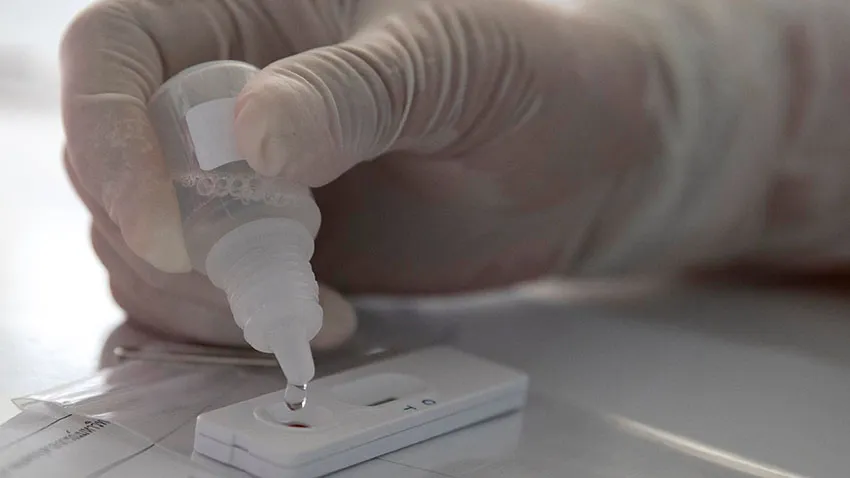
As the world struggles to contain the coronavirus pandemic through lockdowns and social distancing, a new test developed by Stanford University could hold the key to helping life return to normal sooner.
Unlike most current diagnostic tests for COVID-19, which are aimed at detecting the presence of the virus itself, the test developed by the California university looks for protective antibodies against the novel coronavirus.
By analyzing plasma, the liquid in blood, the test will be able "to provide information about a person's immune response to an infection," according to a statement by Stanford University.
The university began offering the test on April 6 and is now testing 500 samples per day, with health care workers and others in the hospital setting being prioritized for taking the test.
"The test will enable us to determine which health care workers might be at low risk for working with COVID-19 patients, as well as understanding disease prevalence in our communities," Lisa Kim, a spokesperson for the School of Medicine at Stanford University, told the Nikkei Asian Review.
Tests like this one -- known as serological tests -- work by measuring the amount of antibodies or proteins present in the blood when the body is responding to a specific infection like COVID-19.
However, the purpose of most existing COVID-19 diagnostics, including some fast antibody test kits, is to determine if the person being tested is currently infected with coronavirus.
Because the new Stanford test is able to detect who has or had the virus in the past, it could also able to tell whether, and for how long, someone might carry antibodies that could protect them from re-infection.
"Understanding the immune response to the virus could also help inform when it is safe for individuals to return to normal activity," the Stanford research team that led the test development said in a statement.
As promising as the new antibody test sounds, however, the method is not perfect because a person whose blood contains coronavirus antibodies could still be sick, contagious or both.
The World Health Organization said on Monday that it is unclear whether patients who have recovered from COVID-19 are immune to further infection as they may not develop sufficient antibodies to resist the virus the next time it enters their body.
"This [antibody test] isn't a perfect tool, but it's one tool that I suspect we'll use to help devise protocols for unwinding shelter-in-place orders," said Thomas Montine, Ph.D. professor and chair of pathology at Stanford School of Medicine.
Despite warnings from public health experts about the need for further study in the area, officials and economists are pinning their hopes on such tests to be able to reopen the economy.
Blood tests for antibodies to the novel coronavirus will be foundational and fundamental for sending Californians back to work, California Gov. Gavin Newsom said in a press briefing last week, highlighting the latest development at Stanford.
Newsom is far from alone in his optimism.
If 60% of the U.S. working population could be given quick serology tests by the end of April and 95% by the end of May, around 90 million sidelined workers could return to the workplace as early as mid-May, according to a report published by Citi.
"We believe antibody testing will be the key to getting the economy back up and running," said Andrew Baum, the lead author of the report.
Serological tests can help identify individuals who have overcome infection in the past and have developed an immune response, but more importantly, "this may potentially be used to help determine ... that such individuals are no longer susceptible to infection and can return to work," said a statement by the U.S. Food and Drug Administration.
"We're working to bring blood-based serology tests to the market as quickly as possible so that Americans can determine whether or not they have already had the virus and potentially have immunity," President Donald Trump said in a press briefing last Friday.
Dr. Anthony Fauci, the leading medical expert on the White House coronavirus task force and director of the U.S. National Institute of Allergy & Infectious Disease, has said mass antibody testing could be a key factor in reopening the U.S., though he also stressed the need for caution.
"I know people are anxious to say, 'Well, we'll give you a passport that says you're antibody-positive, you can go to work and you're protected'," said Fauci in a TV interview on April 10. "But the worst possibility that would happen is if we're actually wrong about that."
Fauci cautioned that most of the tests on the market, which are generally aimed at determining current infection, have not been proven to be reliable and noted that some countries have bought millions of antibody tests only to learn they did not work.
The questionable accuracy and quality control of existing antibody test kits have been a headache for countries that have been banking on large-scale serological tests in fighting COVID-19.
Malaysia's health ministry director-general Dr. Noor Hisham Abdullah said it has decided to purchase test kits from South Korea instead of China to avoid what happened to Spain, which had bought over 3,000 rapid test kits from China but is now not using them "due to the lower accuracy rate," according to local media reports.
Georgia has canceled its contract with the Chinese company which supplied those kits to Spain.
The uncertainty and variety of the quality of commercial serological tests now being developed around the world is one of the reason that drives Stanford University to build its own test kit.
"We thought this was an urgent medical need, and the usual supply chains were unreliable, so we decided to build our own," Montine said.
"We're currently limited by the number of robots we have to run the test. ... Ultimately, we aspire to provide serological testing to as many people in Northern California as we can," he added.




















